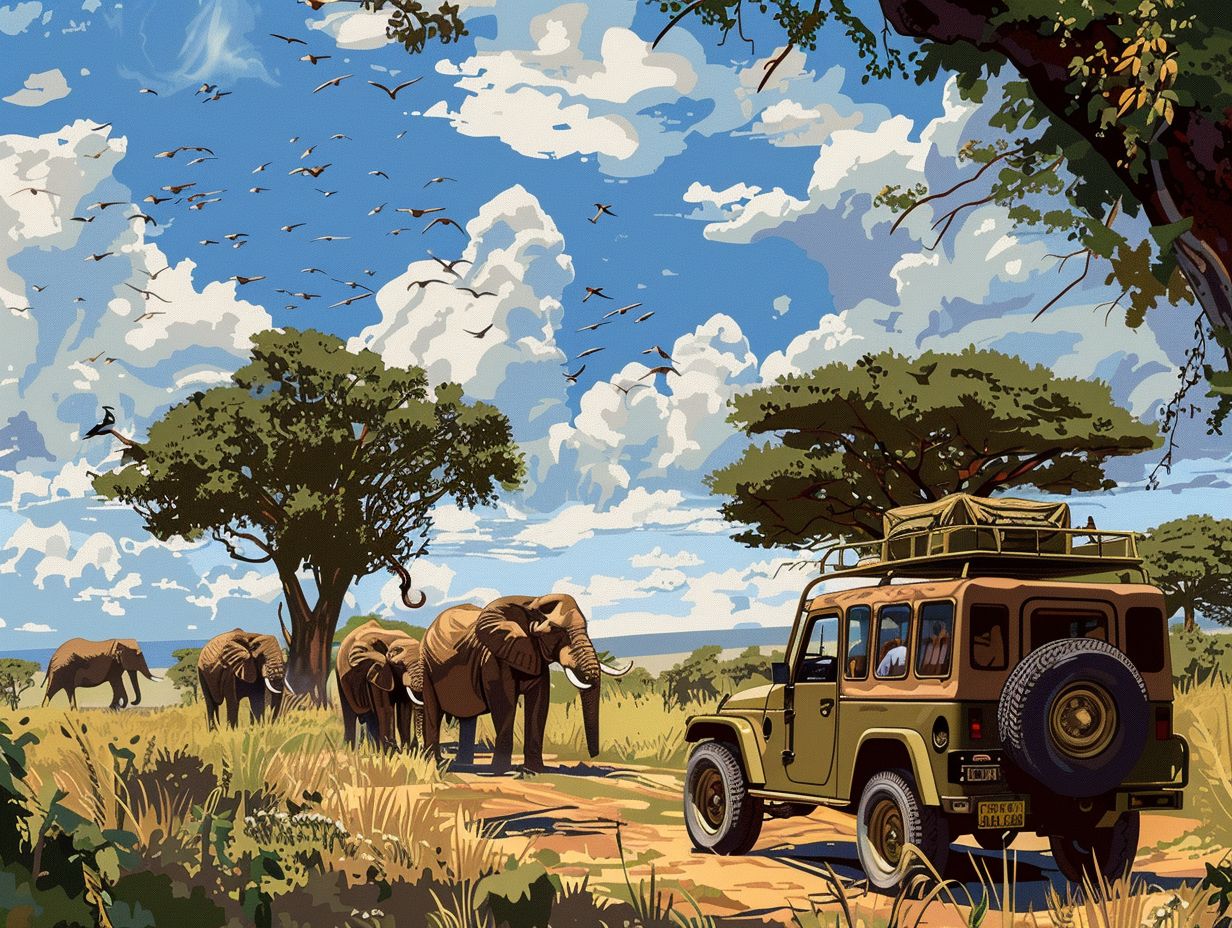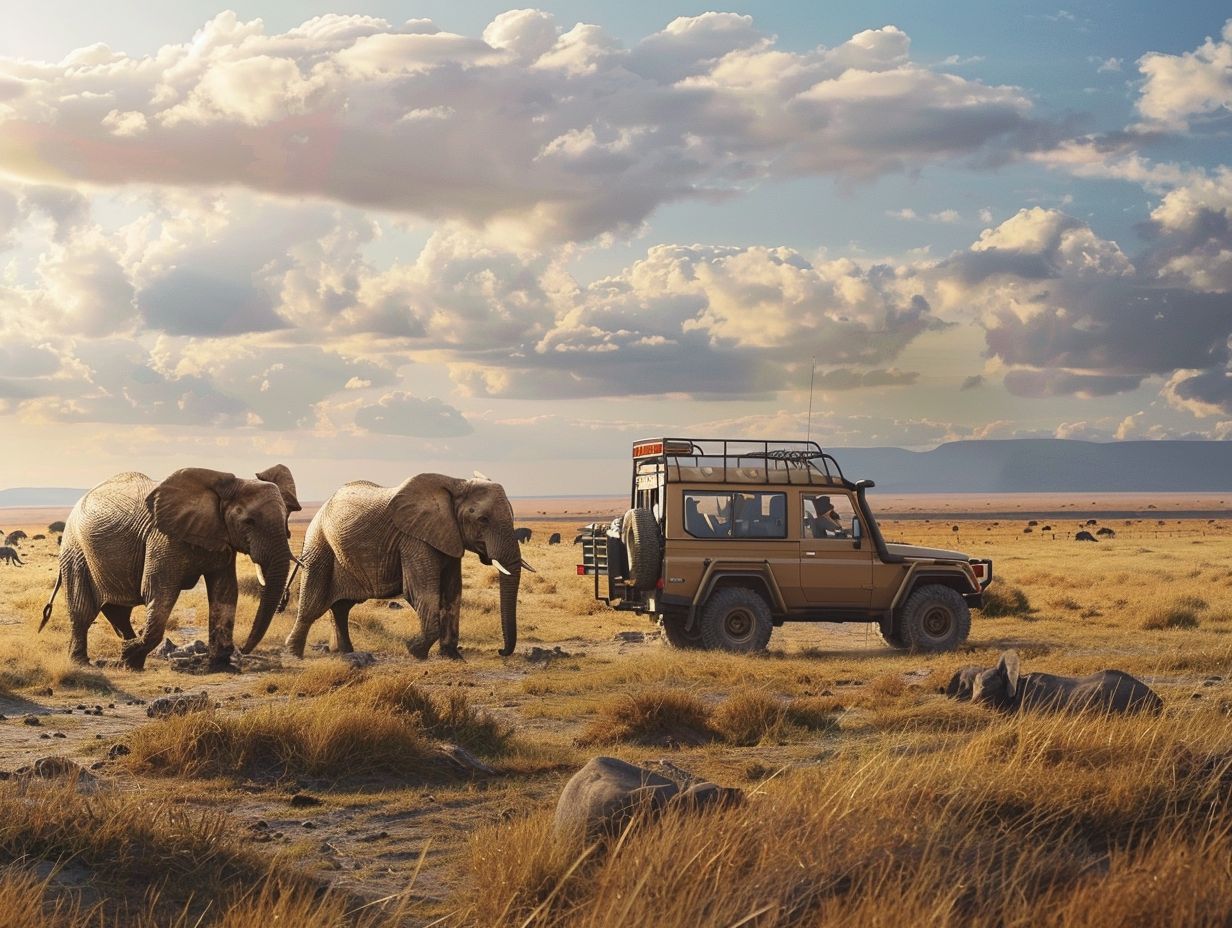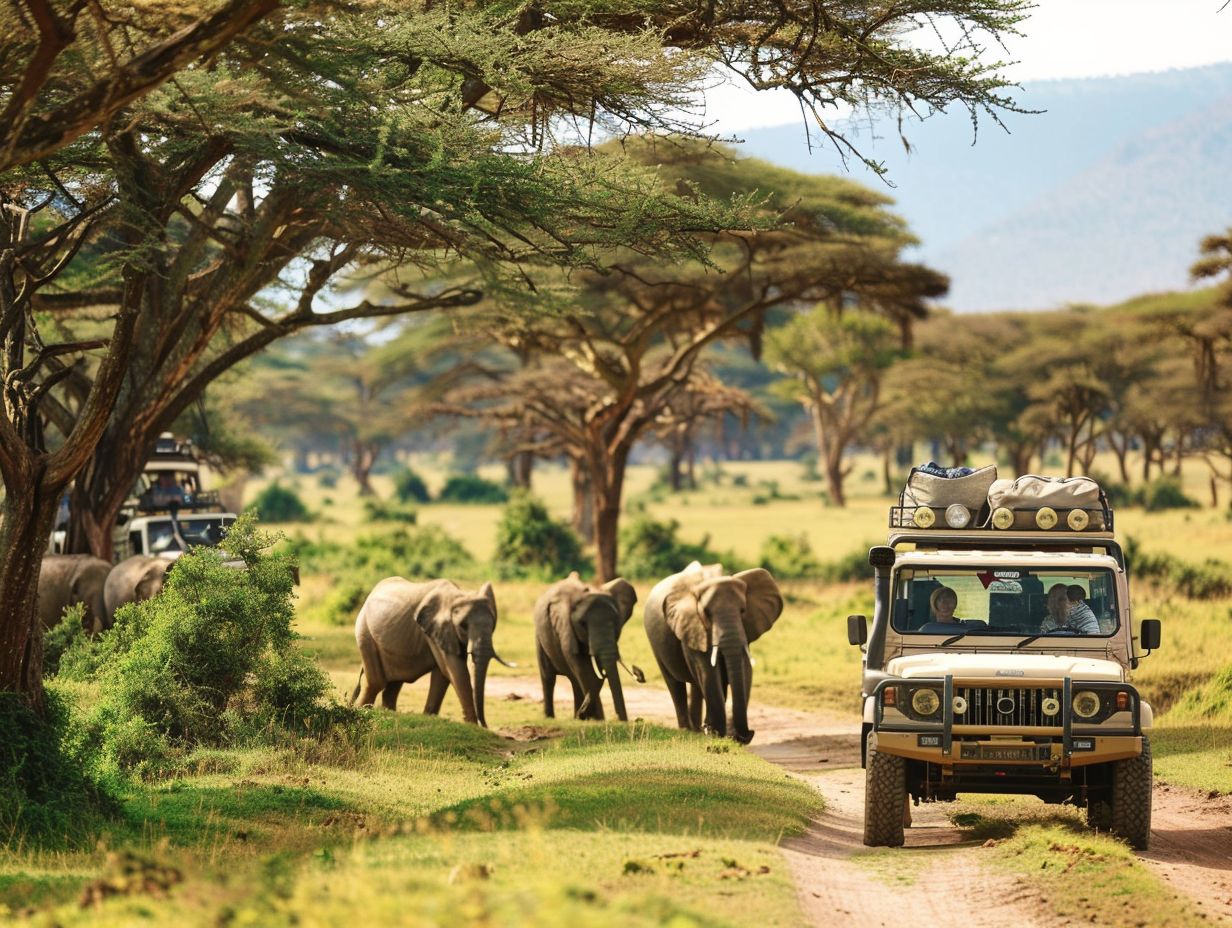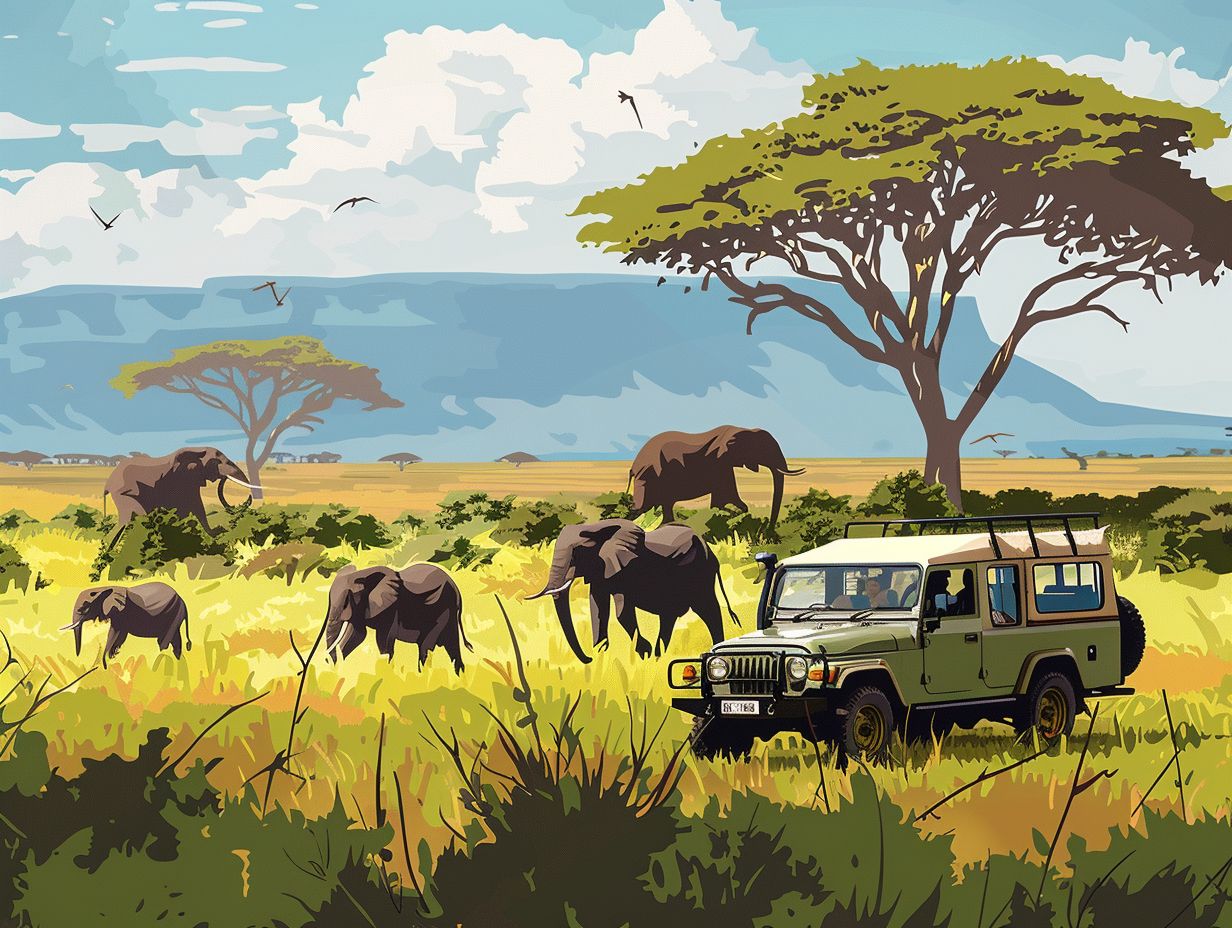
Are Safaris Safe
Safaris offer a thrilling way to experience the beauty of nature and encounter exotic wildlife up close.
Discover the main risks associated with safaris, the safety measures taken by safari companies, and how to stay safe on a safari adventure. Explore the benefits of going on a safari, the different types of safaris available, and the safest safari destinations for your next adventure.
Grab your binoculars and join us as we dive into the world of safaris!
Key Takeaways:

- Safaris can be a safe and thrilling way to experience unique wildlife and immerse oneself in different cultures.
- To ensure safety, it is important to follow safety instructions, stay with a guide at all times, and respect the wildlife.
- South Africa, Botswana, Tanzania, and Kenya are some of the safest destinations for safaris.
What Are Safaris?
African safaris offer an immersive wildlife experience set in the stunning landscapes of Africa. These trips provide a unique opportunity to observe animals in their natural habitats, often staying in camps and using specialized vehicles for game drives.
Striking sunsets over the vast savannas, majestic mountains punctuating the horizon, and lush greenery stretching as far as the eye can see; these are just a few of the picturesque scenes that await safari enthusiasts in Africa.
The diversity of landscapes is astounding – from the iconic Serengeti plains in Tanzania to the rugged beauty of the Okavango Delta in Botswana. Every day brings a new adventure, whether tracking lions on the prowl or witnessing elephants gathering at a watering hole.
How Safe Are Safaris?
Safety is a top priority for African safaris, ensuring that visitors can enjoy their trip without unnecessary risks. By following rules, exhibiting proper behavior around wildlife, and being aware of potential dangers, safaris can be exciting and safe experiences for all participants.
One of the crucial safety measures implemented in safaris involves providing detailed briefings to visitors before embarking on any journey. These briefings cover essential guidelines such as maintaining a safe distance from animals, avoiding sudden movements, and respecting the natural habitat.
Well-trained guides accompany safari groups, offering valuable insights and ensuring that visitors stay within safe zones. Understanding and adhering to these rules not only keep the visitors secure but also protect the wildlife and environment.
-
What Are The Main Risks Of Safaris?
While safaris offer incredible adventures, there are risks associated with encountering dangerous animals, improper behavior, and potential diseases like malaria transmitted by mosquitoes.
Wildlife encounters can be thrilling, but it’s crucial to remember that the animals in their natural habitat may view humans as a threat. It’s important to maintain a safe distance and follow the guide’s instructions to avoid provoking them. Responsible behavior is key to minimizing risks during safaris.
Preventing malaria is another essential aspect to consider. Mosquito bites can transmit the disease, so using insect repellents, wearing long sleeves and pants, and taking antimalarial medication as prescribed are recommended precautions. Stay informed about the necessary vaccinations and adhere to them before your safari adventure.
-
What Are The Safety Measures Taken By Safari Companies?
Safari companies prioritize safety by providing knowledgeable guides, secure vehicles for transportation, suitable accommodation for travelers, and enforcing strict safety rules throughout the journey.
Experienced guides play a crucial role in ensuring that travelers have a rich and informative safari experience. These guides have in-depth knowledge of the local flora and fauna, enhancing the overall adventure. In addition, the reliability of vehicles used during the safari adds an extra layer of security, ensuring smooth and safe transportation across varied terrains.
Accommodations offered by safari companies are carefully selected to provide comfort and relaxation after exhilarating days of exploration. From cozy tents under the stars to luxurious lodges nestled in the heart of nature, travelers can unwind in style.
Strict safety protocols are diligently enforced throughout the journey to mitigate any potential risks. From following wildlife viewing guidelines to adhering to emergency procedures, travelers can embark on their safari with peace of mind.
What Are The Benefits Of Going On A Safari?
Embarking on an African safari offers a plethora of benefits, including unique wildlife experiences, cultural immersion with local communities, and thrilling adventures that create unforgettable memories.
One of the most captivating aspects of going on a safari is the up-close and personal encounters with Africa’s majestic wildlife. Observing elephants roaming freely, witnessing lions on the hunt, and marveling at colorful bird species are just a few of the incredible wildlife experiences that await adventurers.
Safaris provide a wonderful opportunity for cultural exchanges as travelers have the chance to interact with local communities, learning about their traditions, cuisines, and way of life. Engaging with indigenous tribes and discovering their unique customs adds a depth of experience to the journey, fostering mutual understanding and appreciation.
The sense of adventure and excitement that permeates every safari expedition is unparalleled. Whether traversing through vast savannas in a rugged 4×4 vehicle, embarking on guided walking safaris, or staying in luxurious tented camps under the starry sky, each moment is filled with thrill and anticipation, making it a truly unforgettable adventure.
-
Unique Wildlife Experience:
One of the primary benefits of an African safari is the opportunity to witness a diverse array of wildlife up close, whether through exhilarating game drives or immersive bushwalks.
A safari in Africa offers a window into a world where majestic elephants roam freely, graceful giraffes graze peacefully in the savannah, and stealthy lions prowl in search of their next meal. The thrill of encountering these magnificent creatures in their natural habitats is unparalleled, creating lasting memories that will stay with you forever.
- During game drives, you may come face to face with a curious rhinoceros or witness a family of playful meerkats scurrying about.
- On bushwalks, the experience becomes more intimate as you track animal footprints, listen to the birds’ melodious calls, and feel the pulse of the wilderness around you.
Each safari excursion is a unique adventure, promising new surprises with every journey into the heart of the African bush. The close encounters with wildlife foster a deep connection to nature, awakening a sense of wonder and appreciation for the diverse ecosystems that make up this vibrant continent.
-
Cultural Immersion:

Apart from wildlife encounters, African safaris offer a chance for cultural immersion, allowing travelers to interact with local communities, experience traditional customs, and stay in authentic accommodations.
These interactions with local communities provide a deeper insight into the vibrant cultures that have thrived for generations in these territories. Immersing oneself in diverse traditions, travelers create lasting memories by participating in local ceremonies, learning about indigenous crafts, and tasting traditional cuisine.
Cultural exchange is at the heart of these experiences, fostering mutual understanding and appreciation. The authenticity of accommodations, often blending harmoniously with their surroundings, enhances the safari journey by offering a genuine connection to the environment and its people.
-
Adventure and Thrills:
Safaris are synonymous with adventure and thrills, offering participants the chance to explore untamed landscapes, encounter wildlife in their natural habitat, and create lasting memories of an extraordinary journey.
Imagine embarking on a safari, feeling the adrenaline rush as you spot a majestic lion prowling through the grasslands or witness a herd of elephants bathing in a watering hole. The thrill of tracking elusive species, such as leopards or rhinos, adds to the excitement of the journey.
Every moment is filled with anticipation, as each turn in the wilderness unveils a new surprise. The vast expanses of the savannah or the dense jungles hold endless possibilities, making each safari a unique and unforgettable experience.
What Are The Different Types Of Safaris?
Safaris come in various forms, including walking safaris for a close-to-nature experience, driving safaris for a comprehensive wildlife tour, hot air balloon safaris for a unique aerial perspective, and canoe safaris for aquatic adventures.
Walking safaris immerse you in the sights and sounds of the bush, allowing you to connect with the environment on a deeper level, while driving safaris provide the convenience of covering vast distances to spot a variety of wildlife species.
Hot air balloon safaris offer a bird’s eye view of the savannah, providing a truly magical and serene experience as you glide over the landscape at sunrise or sunset.
Canoe safaris, on the other hand, take you through winding waterways, offering a peaceful way to observe aquatic life and enjoy the tranquility of the water.
-
Walking Safaris:
Walking safaris provide an intimate experience with the wilderness, allowing participants to explore on foot, observe wildlife up close, and engage in thrilling bushwalks guided by experienced naturalists.
This type of safari brings you face-to-face with the sights, sounds, and scents of the bush in a way that is impossible from a vehicle. As you quietly tread through the terrain, you can truly immerse yourself in the ecosystem, noticing the intricate details of nature that may go unnoticed from a distance.
Encountering wildlife on foot is a truly unforgettable experience that ignites all the senses. Whether you come across a herd of elephants peacefully grazing or a pride of lions lazily basking in the sun, the proximity and lack of engine noise create a deeper connection to the animal kingdom.
Expert guides lead these excursions, sharing their knowledge about the flora, fauna, and survival skills necessary in the wild. Their keen senses and trained eyes not only ensure your safety but also enhance the adventure by pointing out hidden gems along the way.
-
Driving Safaris:
Driving safaris offer a comprehensive wildlife experience, using specialized vehicles to traverse diverse landscapes, spot animals in their natural habitat, and engage in exciting game drives led by knowledgeable guides.
One of the key advantages of embarking on a driving safari is the convenience it offers in terms of vehicle transportation. You are able to cover vast terrains comfortably, allowing you to witness a wide range of wildlife species without the limitations of walking safaris.
The thrill of game drives adds an element of excitement as you venture off the beaten path to seek out elusive creatures. Whether it’s the majestic lions prowling or the graceful giraffes grazing, each sighting adds to the enchantment of your safari experience.
-
Hot Air Balloon Safaris:
Hot air balloon safaris provide a unique perspective of the landscape and wildlife from the air, offering a serene and exhilarating adventure with breathtaking views of animals and nature below.
The beauty of a hot air balloon safari lies not just in the panoramic vistas it unveils but also in the peacefulness that envelops you as you glide through the crisp morning air.
Imagine drifting silently above the African savannah, witnessing the sun casting its golden hues over the endless grasslands, creating a spectacle like no other.
As the gentle wind carries you effortlessly, you have the rare opportunity to observe wildlife undisturbed in their natural habitat, from majestic elephants roaming below to graceful giraffes elegantly moving across the terrain.
-
Canoe Safaris:
Canoe safaris provide an aquatic adventure through rivers and waterways, allowing participants to observe wildlife from a unique vantage point, experience the tranquility of the water, and engage in close encounters with animals.
As you glide along the serene waters, the gentle paddling creates a peaceful rhythm that enhances the connection with nature. The stillness of the surroundings amplifies every bird call and rustle of leaves, immersing you in the sounds of the wilderness.
Encountering wildlife in their natural habitat, whether it’s a graceful heron taking flight or a curious otter peeking from the riverbank, offers a magical and unforgettable experience.
How To Stay Safe On A Safari?

Ensuring safety on a safari requires following essential guidelines, such as adhering to safety instructions, staying with a knowledgeable guide at all times, respecting the wildlife, and being prepared for emergencies.
One crucial aspect of safari safety is to avoid sudden movements or loud noises that could startle the animals. It’s also important to keep a safe distance from wildlife and never attempt to touch or feed them. By maintaining a respectful distance, both the animals and participants can coexist peacefully.
Emergency readiness is paramount on a safari. Make sure to carry essential items such as a first aid kit, whistle, flashlight, and extra water. Knowing basic emergency procedures and how to contact help in case of an emergency can make a significant difference in ensuring a safe and enjoyable safari experience.
-
Follow Safety Instructions:
Following safety instructions provided by guides is crucial to ensure a secure and enjoyable safari experience. These guidelines help visitors navigate the wilderness safely and minimize potential risks.
Professional guides play a vital role in safeguarding both visitors and wildlife during a safari. With their expertise and knowledge of the environment, guides are instrumental in spotting potential dangers and ensuring that visitors adhere to safety protocols.
Visitor compliance is equally essential as it contributes to the overall safety of the expedition. By following the instructions given by guides, guests not only protect themselves but also respect the natural habitat and wildlife they encounter.
Strict adherence to safety rules not only enhances the experience for everyone involved but also sets a standard for responsible eco-tourism practices. Implementing these measures not only safeguards participants but also helps in conserving the fragile ecosystems that make safaris so captivating and unique.
-
Stay with a Guide at All Times:
Remaining with a knowledgeable guide throughout the safari is essential for personal safety, wildlife awareness, responsible behavior, and immediate assistance in case of emergencies.
Guides play a pivotal role in enhancing the safari experience by sharing their in-depth knowledge of the local flora and fauna, enriching your understanding of the ecosystem. Their expertise extends beyond just spotting wildlife; they can also impart valuable insights on animal behavior, habitats, and conservation efforts.
Experienced guides are well-equipped to handle any unforeseen circumstances, ensuring a smooth and secure journey. They are trained in first aid and emergency protocols, ready to act swiftly in critical situations, providing a sense of reassurance and comfort to safari participants.
-
Respect the Wildlife:
Respecting the wildlife encountered during safaris is paramount, ensuring ethical interactions, minimal disturbances to animals, adherence to rules, and conservation of natural habitats.
By respecting the natural environment and its inhabitants, safari-goers can contribute to the sustainability of these habitats, allowing future generations to enjoy the beauty of untouched wilderness.
When visitors act responsibly and follow guidelines set by conservationists, they show their dedication to preserving the delicate balance of ecosystems. This not only ensures the well-being of the animals but also fosters a deeper connection between humans and nature, enhancing the overall safari experience.
-
Be Prepared for Emergencies:
Preparedness for emergencies is vital on safaris, requiring participants to equip themselves with essential supplies, follow guide instructions, maintain calm in crisis situations, and prioritize safety at all times.
When venturing into the wilderness during a safari, it’s crucial to ensure that you are well-prepared for any unexpected situations that may arise. By carrying first aid kits, ample water supply, emergency rations, and communication devices, you are equipping yourself to handle a variety of emergency scenarios.
Trusting in the expertise of your safari guides is key. They possess valuable knowledge of the terrain, wildlife behavior, and how to navigate through potential dangers. In times of crisis, following their instructions diligently can make a significant difference in ensuring safety for all participants.
During an emergency, maintaining a calm demeanor is essential. Panicking can escalate a situation and hinder rational decision-making. Keeping a level head allows you to assess the circumstances and act accordingly to mitigate risks.
Ultimately, the responsibility for one’s safety rests with each traveler. By practicing good judgment, adhering to safety protocols, and staying vigilant, you contribute to a secure and enjoyable safari adventure for yourself and fellow participants.
What Are The Safest Safari Destinations?
For those seeking safe and rewarding safari experiences, South Africa, Botswana, Tanzania, and Kenya are renowned as some of the safest and most captivating safari destinations in Africa.
These countries offer a perfect blend of thrilling wildlife encounters and luxurious accommodations, ensuring visitors have an unforgettable journey. South Africa’s Kruger National Park boasts the Big Five and diverse landscapes, while Botswana’s Okavango Delta provides unique water-based safaris.
In Tanzania, the Serengeti National Park’s vast plains witness the Great Migration, a remarkable spectacle. Meanwhile, Kenya’s Maasai Mara National Reserve is known for its abundant wildlife and authentic cultural experiences.
-
South Africa:
South Africa stands out as a safe and alluring safari destination, offering travelers a mix of wildlife encounters, stunning landscapes, diverse accommodations, and well-developed tourism infrastructure.
Within the pristine wilderness of South Africa, one can embark on thrilling game drives to catch a glimpse of the ‘Big Five’ – lions, leopards, elephants, rhinos, and buffaloes in their natural habitat.
The country’s national parks, like Kruger National Park, boast a rich biodiversity including myriad bird species and other rare animals. Visitors can also enjoy bush walks or guided safaris to fully immerse themselves in the African wilderness.
-
Botswana:

Botswana is celebrated for its safe and enriching safari offerings, featuring pristine wilderness, abundant wildlife sightings, luxury accommodations, and exclusive travel experiences that cater to discerning travelers.
One of the key aspects that makes Botswana stand out is its commitment to low-impact tourism, ensuring the natural habitats and wildlife are preserved for future generations to enjoy. The country’s vast and untamed landscapes provide a sense of true wilderness, allowing visitors to witness the raw beauty of nature up close.
The abundance of wildlife in Botswana is truly remarkable, with its renowned Big Five – lions, elephants, buffalo, leopards, and rhinos – being commonly sighted during safaris. This rich biodiversity combined with experienced guides enhances the chances of unforgettable animal encounters.
For those seeking a touch of luxury, Botswana offers an array of high-end lodges and camps that blend seamlessly with the natural surroundings, providing a unique and indulgent safari experience. Immerse yourself in the lap of luxury after an adventurous day out in the bush.
-
Tanzania:
Tanzania is recognized for its safe and diverse safari encounters, presenting travelers with iconic wildlife species, breathtaking natural wonders like the Serengeti, and authentic cultural experiences that define the essence of African safaris.
One of the highlights of embarking on a safari expedition in Tanzania is the opportunity to witness the Great Migration, where millions of wildebeests, zebras, and other animals traverse the Serengeti in search of greener pastures. The sheer scale and drama of this annual event is truly a sight to behold, capturing the raw essence of nature’s marvels.
-
Kenya:
Kenya offers a safe and remarkable safari experience, combining thrilling wildlife encounters in renowned national parks like Maasai Mara, diverse ecosystems, comfortable accommodations, and cultural interactions that capture the essence of African safaris.
Exploring the vast plains of Maasai Mara, visitors have the chance to witness the Great Migration, where millions of wildebeest and zebras traverse the savannah in search of greener pastures.
The sight of predators lurking nearby adds an exhilarating touch to the experience. Beyond wildlife spectacles, Kenya’s landscapes range from snow-capped mountains to sun-kissed beaches, ensuring a diverse visual treat for travelers.
- For lodging, travelers can choose from luxurious tented camps overlooking the wilderness or elegant lodges blending modern comfort with traditional African design.
- Engaging in cultural activities such as visiting Maasai villages or learning about local traditions adds a deeper layer of appreciation for the destination.
Frequently Asked Questions:
1. Is it safe to go on a safari in Africa?
A: Yes, as long as you follow the safety guidelines and precautions set by your tour guide or safari company. These include staying inside the vehicle at all times, not approaching or feeding wild animals, and listening to the instructions of your guide.
2. What are some common safety risks on a safari?
A: The most common risks on a safari include animal attacks, vehicle accidents, and exposure to the elements. However, these risks can be minimized by following safety guidelines and choosing a reputable safari company.
3. Are there any health concerns to be aware of on a safari?
A: Yes, it is important to take precautions against malaria and other mosquito-borne diseases when going on a safari in Africa. It is recommended to consult with a healthcare professional and get necessary vaccinations before traveling.
4. What should I do if I encounter a dangerous animal on a safari?
A: The best thing to do is to follow the instructions of your safari guide. They are trained to handle these situations and will know how to safely guide you away from the animal. It is important to remain calm and not make sudden movements.
5. Is it safe to bring children on a safari?
A: Yes, as long as they are supervised and follow the safety guidelines set by the tour guide. Some safari companies may have age restrictions for certain activities, so it is best to check with them beforehand.
6. What should I do if I get lost on a safari?
A: If you stray from your group or get separated from your guide, stay calm and do not panic. Use your phone or a whistle to try and signal for help. It is also a good idea to have a map or GPS device with you for navigation in case of emergencies.